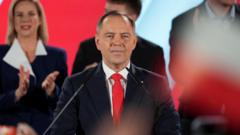As 2025 approaches, the UK and EU are poised for a potential "reset" in their relations, shaped by current geopolitical challenges. With the Labour government under Prime Minister Sir Keir Starmer seeking closer collaboration on security and economic issues, the upcoming informal summit in February could set the stage for significant negotiations. However, navigating the complexities of post-Brexit trade-offs remains a challenge, with EU diplomats expressing both optimism and skepticism about the UK's willingness to yield on key issues.
A New Chapter Ahead: UK and EU Prepare for Potential Reset in 2025

A New Chapter Ahead: UK and EU Prepare for Potential Reset in 2025
Amidst global uncertainties, UK Prime Minister Keir Starmer plans significant engagement with the EU in 2025 for security and trade discussions.
The backdrop to this anticipated reset is a world marked by insecurity, with escalating conflicts not only in the Middle East but also in Europe, particularly due to the ongoing Russian aggression in Ukraine. This precarious environment, compounded by the potential return of former US President Donald Trump and his divisive trade policies, has catalyzed a reevaluation of UK-EU ties.
Since the Labour Party's electoral victory, there's been a flurry of diplomatic activity aimed at reviving relations that soured during the Brexit saga. Foreign Secretary David Lammy and Chancellor Rachel Reeves have engaged with EU counterparts, indicating a commitment to an "ambitious reset" of relations to address pressing matters like the economy, defence, and immigration.
Despite the goodwill being expressed, much of the future relationship will depend on the compromises both sides are willing to make. While the UK has committed to strengthening defence and security collaboration—an area viewed as relatively straightforward—questions remain regarding the potential for easing trade negotiations, particularly given the hard-line stance on issues like freedom of movement and customs regulations.
Observers note that while a closer defence pact may appear beneficial, relying on it as leverage for trade concessions could be a miscalculation for the UK. EU leaders have firmly indicated that significant changes in trade relations will require addressing foundational post-Brexit red lines.
Moreover, topics like fishing rights and the potential revival of a Youth Mobility Scheme may emerge as negotiation tools, with the UK's willingness to align more closely with EU rules proving crucial. The impending talks will need to balance domestic economic interests with the necessity of rebuilding a cooperative spirit with European partners.
Amid these complex negotiations, public sentiment is shifting on both sides of the Channel. Polls reveal a notable appetite among voters in the UK for increased collaboration with the EU, particularly to enhance economic and security measures. If political leaders can align with the public's growing support for cooperation, the next several years could see a meaningful transformation in UK-EU relations.
As we move closer to 2025, eyes will be on the forthcoming discussions between the UK and EU—a partnership that could redefine the region's security and economic landscape amidst global uncertainties.
Since the Labour Party's electoral victory, there's been a flurry of diplomatic activity aimed at reviving relations that soured during the Brexit saga. Foreign Secretary David Lammy and Chancellor Rachel Reeves have engaged with EU counterparts, indicating a commitment to an "ambitious reset" of relations to address pressing matters like the economy, defence, and immigration.
Despite the goodwill being expressed, much of the future relationship will depend on the compromises both sides are willing to make. While the UK has committed to strengthening defence and security collaboration—an area viewed as relatively straightforward—questions remain regarding the potential for easing trade negotiations, particularly given the hard-line stance on issues like freedom of movement and customs regulations.
Observers note that while a closer defence pact may appear beneficial, relying on it as leverage for trade concessions could be a miscalculation for the UK. EU leaders have firmly indicated that significant changes in trade relations will require addressing foundational post-Brexit red lines.
Moreover, topics like fishing rights and the potential revival of a Youth Mobility Scheme may emerge as negotiation tools, with the UK's willingness to align more closely with EU rules proving crucial. The impending talks will need to balance domestic economic interests with the necessity of rebuilding a cooperative spirit with European partners.
Amid these complex negotiations, public sentiment is shifting on both sides of the Channel. Polls reveal a notable appetite among voters in the UK for increased collaboration with the EU, particularly to enhance economic and security measures. If political leaders can align with the public's growing support for cooperation, the next several years could see a meaningful transformation in UK-EU relations.
As we move closer to 2025, eyes will be on the forthcoming discussions between the UK and EU—a partnership that could redefine the region's security and economic landscape amidst global uncertainties.






















